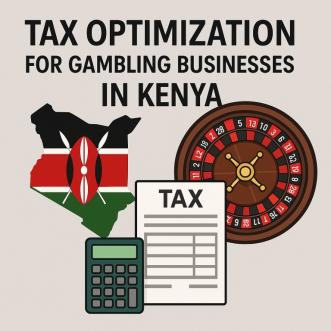Blog

24/10/2025
Tax Optimization for Gambling Businesses in Kenya
Introduction: Understanding Tax Optimization in Kenya’s Gambling Industry
Tax optimization for gambling businesses in Kenya is more critical than ever. With the rapid growth of sports betting, lotteries, and online casinos, operators face heavy taxation from the Kenya Revenue Authority (KRA) and strict compliance from the Betting Control and Licensing Board (BCLB). However, smart tax planning and strategic financial management can significantly reduce your tax burden while maintaining full compliance.
Tax optimization doesn’t mean tax evasion — it’s about maximizing legal tax advantages through deductions, timing, and efficient structures. This guide explores how Kenyan gambling businesses can stay competitive by legally minimizing tax exposure and enhancing financial health.
Overview of the Gambling Industry in Kenya
Growth of Betting, Casinos, and Lotteries in Kenya
Kenya’s gambling sector has seen explosive growth since the mid-2010s, driven by technology, mobile money platforms, and the popularity of sports betting. The industry is now valued at over KES 200 billion annually, making it one of the most lucrative sectors in East Africa.
Key Regulators: Betting Control and Licensing Board (BCLB) and Kenya Revenue Authority (KRA)
The BCLB regulates licensing and operations, while the KRA oversees taxation. Together, they enforce compliance, collect gaming taxes, and ensure that gambling revenues are fairly distributed through public taxation frameworks.
Taxation Framework for Gambling Businesses in Kenya
Types of Taxes Applicable to Gambling Operators
Gambling businesses in Kenya face multiple taxes, including:
- Betting Tax (15% on gross gaming revenue)
- Withholding Tax on Winnings (20%)
- Corporate Income Tax (30%)
- Value Added Tax (VAT) (16% where applicable)
- Excise Duty (7.5% on betting stakes)
Overview of Betting, Lottery, and Gaming Tax Rates
Each segment—betting, casino, and lottery—faces distinct tax rates. For example, lotteries pay 15% of gross turnover as tax, while casinos pay tax on winnings and table game revenues.
Compliance Requirements and Penalties for Non-Compliance
Failure to remit taxes on time can attract severe penalties, including:
- License suspension by BCLB
- Fines from KRA
- Possible business closure
Maintaining accurate records and timely remittance is key to avoiding these risks.
Common Tax Challenges Faced by Gambling Businesses
Inconsistent Tax Policies and Legal Ambiguities
Frequent amendments to Kenya’s gambling tax laws create uncertainty for operators. For instance, the betting tax rate has changed several times in recent years.
Complex Record-Keeping Requirements
Tracking all betting transactions and winnings can be complex, especially for online platforms handling millions of transactions daily.
High Operational and Licensing Costs
Licensing fees, compliance costs, and advertising restrictions often make profit margins tight, emphasizing the need for effective tax optimization strategies.
Top Tax Optimization Strategies for Gambling Businesses
Strategic Tax Planning and Timing
Plan your tax obligations around cash flow cycles. Delay non-critical expenses and align income recognition with lower-tax periods, ensuring optimal financial positioning.
Leveraging Tax Deductions and Allowable Expenses
Deduct allowable operational costs like:
- Advertising and promotion
- Employee salaries
- Software licensing fees
- Rent and administrative expenses
These reduce your taxable income significantly.
Using Offshore Structures within Legal Limits
Kenyan firms can set up holding companies in low-tax jurisdictions for certain operations, provided they comply with anti-money laundering (AML) and KRA reporting regulations.
Efficient Cash Flow and Revenue Recognition Management
Separate gaming revenue streams (betting, lotteries, gaming) to improve reporting accuracy and manage taxes efficiently.
Partnering with Licensed Tax Consultants
Engaging a tax professional ensures compliance and maximizes savings through expert interpretation of Kenya’s complex tax laws.
Digital Transformation and Tax Efficiency
Role of Automated Accounting Systems
Automated accounting tools help track real-time tax liabilities, generate instant reports, and reduce human error during tax filings.
Blockchain Technology for Transparent Transactions
Blockchain ensures immutable and auditable financial records, increasing trust with regulators and simplifying tax reconciliation.
AI and Data Analytics for Tax Forecasting
Predictive analytics helps anticipate future tax obligations, ensuring adequate reserves and better financial management.
Legal and Ethical Considerations in Tax Optimization
Difference Between Tax Avoidance and Tax Evasion
Tax avoidance is legal and strategic, while tax evasion involves illegal practices like concealing income. Gambling firms must maintain ethical transparency.
Importance of Ethical Business Practices
Building long-term success requires compliance, transparency, and trust with both customers and regulators.
Case Study: Successful Tax Optimization in a Kenyan Betting Firm
Key Strategies Implemented
A leading Nairobi-based sportsbook adopted digital accounting, hired professional tax advisors, and optimized expenses through accurate deductions.
Lessons Learned and Takeaways
Legal compliance and proactive planning can save up to 20% of annual tax liabilities while improving overall business sustainability.
Role of Tax Consultants and Advisors in Kenya
Benefits of Professional Tax Advisory Services
- Ensure compliance with evolving KRA regulations
- Identify potential tax reliefs
- Help structure financial operations efficiently
Selecting the Right Tax Partner for Your Business
Choose certified consultants familiar with the gambling sector and Kenya’s tax regime.
Future Outlook: The Evolving Tax Landscape for Gambling in Kenya
Impact of Digital Taxation
The rise of online gaming and mobile money has prompted KRA to introduce digital service taxes, impacting betting and casino platforms.
Emerging Opportunities and Reforms
Expected reforms in 2026 may standardize gambling taxes, making compliance easier and more predictable.
FAQs on Tax Optimization for Gambling Businesses in Kenya
1. What is the current tax rate for betting businesses in Kenya?
The betting tax is 15% on gross gaming revenue, with an additional 20% withholding tax on winnings.
2. Are online betting companies taxed differently?
No. Online and offline operators are subject to the same tax structure under KRA’s framework.
3. Can gambling companies claim VAT refunds?
Yes, if they supply taxable services and maintain proper documentation.
4. What expenses can gambling businesses deduct for tax purposes?
Operational costs, including advertising, rent, staff wages, and licensing fees, are deductible.
5. What happens if a company delays tax remittance?
Late payment attracts penalties and interest, and may lead to license suspension.
6. Is using offshore structures legal for tax planning?
Yes, provided all operations comply with KRA’s disclosure and anti-money laundering requirements.
Conclusion: Building a Sustainable and Compliant Gambling Enterprise
Tax optimization for gambling businesses in Kenya is not just about saving money—it’s about ensuring long-term compliance, stability, and profitability. With proper planning, digital tools, and professional advice, gambling operators can thrive in an evolving regulatory environment.

